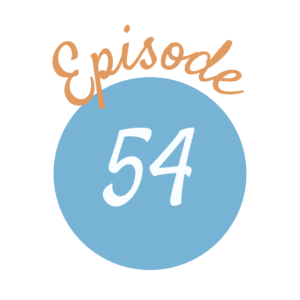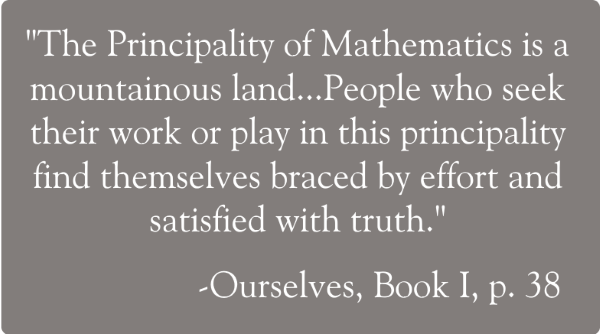How in the world did Charlotte Mason approach the subject of math? This podcast episode explores that question and addresses our qualms and insecurities in teaching math to our children. How do we avoid fears, tears, pushing and pulling, and reach to its infinite beauty as an instrument in acquiring knowledge of the universe?
Listen Now:
“Arithmetic, Mathematics, are exceedingly easy to examine upon and so long as education is regulated by examinations so long shall we have teaching, directed not to awaken a sense of awe in contemplating a self-existing science, but rather to secure exactness and ingenuity in the treatment of problems.” (Vol. 6, p. 231)
“…the use of the study in practical life is the least of its uses. The chief value of arithmetic, like that of higher mathematics, lies in the training it affords to the reasoning powers, and in the habits of insight, readiness, accuracy, intellectual truthfulness it engenders.” (Vol. 1, p. 254)
“Never are the operations of Reason more delightful and more perfect than in mathematics…By degrees, absolute truth unfolds itself. We are so made that truth, absolute and certain truth, is a perfect joy to us; and that is the joy that mathematics afford.” (Vol. 4, p. 63)
“Let his arithmetic lesson be to the child a daily exercise in clear thinking and rapid, careful execution, and his mental growth will be as obvious as the sprouting of seedlings in the spring.” (Vol. 1, p. 261)
“Mathematics depend upon the teacher rather than upon the text-book and few subjects are worse taught; chiefly because teachers have seldom time to give the inspiring ideas, what Coleridge calls, the ‘Captain’ ideas, which should quicken imagination.” (Vol. 6, p. 233)
“There is no must be to him he does not see that one process, and one process only, can give the required result. Now, a child who does not know what rule to apply to a simple problem within his grasp, has been ill taught from the first, although he may produce slatefuls of quite right sums in multiplication or long division.” (Vol. 1, p. 254)
“…’nearly right’ is the verdict, a judgment inadmissible in arithmetic.” (Vol. 1, p. 255)
If you would like to study along with us, here are some passages from The Home Education Series and other Parent’s Review articles that would be helpful for this episode’s topic. You may also read the series online here, or get the free Kindle version from Fisher Academy.
Home Education, Part V, XV
Towards a Philosophy of Education, Book I, Chapter 10, Section III
String, Straightedge and Shadow
(Contains affiliate links)







Thank you ladies for finally touching on mathematics!! Just a few weeks ago I purchased the above mentioned teaching resource, math is a weak areafor my husband and I, so when our year 2 daughter showed signs of just not getting it, I knew I had to learn and dig deep myself! I happened across a topic on Liz's blog that lead me to the discovery of the linked resource. The DVD has been so useful!!! I have learned how to teach math better, my daughter enjoys watching it also. Haven't completely watched it all yet, but we are implementing the methods as we go along and I have seen a great improvement in our math lessons!! How do you feel about MEP?
As always, helpful and encouraging. Thanks, ladies.
Love! Thank you for this–have been using Khan Academy to teach my Form 1 students and this was really encouraging to keep going! Even tho its not a program, I can use it as a teacher to do just as you described here. Yay 🙂
Suggestion: Id love to hear other reviews of DE–could you read one or two at the end of the podcast?
Maybe youve had this suggested before and ruled it out…but I just think it would be encouraging to hear from other educators who are tuning in 🙂 I dont have a CM group right now and this podcasts has served me so well as an encourment and inspiration to keep going. There is such peace of mind knowing other moms have done and are doing this approach to whole person education:) Thank you
Can't wait to hear your upcoming episodes on math! Do any of you have any experience with MEP? That's what we use, and I'm no expert, but so far, I love it. Each lesson is short (we only do it for 20min no matter what, but it usually doesn't take longer than that) and there's a lot of mental math work. I also like the approach much better. I'm reading "Knowing and Teaching Mathematics" by Liping Ma (VERY SLOWLY!) and she talks about the difference between American math teachers and others around the world (namely Chinese) and the approach is SO DIFFERENT! I'm only about 12 pages in and *I've* learned so much! Anyway, MEP teaches math similarly to the way she mentions in her book. I won't bore you with the details, but it is fascinating! (Never thought I'd hear myself say that! LOL)
MEP is spiral and I think that's not a CM thing, but honestly, I've seen the benefits of a spiral program firsthand.
I'm curious to hear your thoughts!
Maria,
Thank you for sharing your experience. We have all been blessed by Richele's research and experience. I am not familiar with M.E.P. other than what is on their website and would just say, before choosing any curriculum, carefully consider whether this is what God wants you to do and whether it truly follows Mason's prescriptives.
-Liz
Heather,
You can't believe how encouraged we are to know our conversations on Mason are encouraging you. We say "living" education so easily, but don't even realize how much it breathes life into us as the teachers.
-Liz
Catie,
As you know, a CM education, in any subject, is not dependent on any curriculum product, but upon the method in which the subject is taught. Living math teaching the CM way is not found in any one math program that is available for purchase, but one can still follow a progression in instruction in a way that very soundly builds math knowledge for the child. I am glad our podcast is inspiring you to read and research.
-Liz
Thank you, Amy!
Thank you! The next podcast was helpful in understanding it better. 🙂
Great. Look forward to the next two for even more clarity.
-Liz
I really enjoyed this podcast ladies. I had already made many of these changes in how I approached math with my boys and found that it definitely creates a peaceful and more productive math lesson.
I did have one question about not allowing them to correct their mistakes. I've been pondering this thought and understand Charlotte Mason's points. But even though in life we cannot undo our mistakes, shouldn't we try to make what is wrong right? If I've offended, should I not try to make it right? I can see where letting the child know that careless work has consequences is a very important truth to learn, but also I just wonder what your thoughts are on the reality that we will mess up but we can try to make wrongs right and can this truth also be helpful as it relates to math. Just curious if anyone else has felt this way.
Hi Elizabeth,
That's a really good question. I think if we read in Vol. I pp. 254-261 we gain a much clearer understanding of Miss Mason's thoughts here. She is speaking to the teacher's actions in large part. Is she allowing slipshod work and fostering careless habits or is the student not understanding the concept? Either way, the teacher has something to rectify.
Miss Mason would not leave the child without hope; rather, the teacher ensures he begins with a new hope. For example, if my son makes a mistake on an algebra problem I ask him to show me where he went wrong. If it was carelessness on his part he recognizes it and it would do no good to have a "do-over", which would take the edge off of intellectual and moral habit training. If he has not understood the concept then I need to secure his understanding and he gets a different problem.
My younger son has been most recently in unit conversion. He knows that if he fails to put the unit of measurement in then the answer is wrong. You see, he may know with which units he is working but that doesn't ensure others will. I've told him how NASA lost a $125 million Mars probe when a contractor used English units rather than the standard metric units without specifying. This ignited his imagination enough to guarantee those units are always defined.
What do you think?
Best,
Richele
Elizabeth,
I have often pondered the wisdom of letting a child carry on without rectifying, or as you put it into relational terms, not making restitution. One thing I have considered is that, first, as Richele has pointed out, it is not wrong for the child to see where he has gone wrong; this is our proper attitude when we have made a mistake as well–realize where we have erred. However, true repentance is always shown by a change of attitude, behavior, course of life. The child must therefore go on to new problems (or, by extension to real life, new interactions and circumstances) putting into practice what has been shown to be wrong by not repeating those same infractions or mistakes again. We must see how we have offended, then endeavor not to repeat our error.
-Liz
One of my concerns is trying to figure out with one of my children if it is careless work or lack of understanding. He doesn't like to leave a wrong answer, so I see the importance of letting him accept the consequences if it is careless work. But his explaining can seem like a black hole sometimes. Lol! So, I opted to have him rework the problem on a dry erase board so I could see what the problem is. This helped me to understand, without him getting to erase and correct the missed problem. Thanks for your insight too.
Thank you for your thoughts Richele. As I replied to Liz, I have found a solution to help me, as the teacher, see where work is needed and how I can help. One of my sons, who misses most of his work from carelessness, I feel would benefit greatly from feeling the effects of not getting to correct his work. After, thinking through this new concept to me, I see where not getting a "do-over" is best. I see where this would help in habit training. As long as I can identify and understand the area I need to help him in, I can live with no "do'overs". Thanks for your insight too!
Also have a question about not correcting work. In dictation, CM didn’t even want the student to see a misspelled word, but in math it is different? Can you all clarify this for me? I have already graduated my older 3 with CM methods but still have more to learn! Amazing!
In Math, the learning is the reasoning happening in their head. They aren’t visualizing the equation in the same way they visualize the word/phrase/sentence in dictation, so *seeing* the wrong answer in math doesn’t pose the same problem as *seeing* the misspelled word in dictation.
Thank you for clarifying! I remember reading about this years ago when beginning my homeschool journey and reading CM for the first time, but I never understood why and never saw it addressed. Thank You!